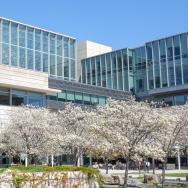Since its founding in 1898 as the College of Commerce and Administration, the University of Chicago Booth School of Business has again and again set out paths that other institutions have followed.
It established the first business doctoral program in 1920 and the first executive MBA in 1943; it was first to award a business degree to an African American student and a business PhD to a woman. In 1982, Booth’s George Stigler, PhD’38, became the first faculty member of a business school to receive the Sveriges Riksbank Prize in Economic Sciences in Memory of Alfred Nobel (followed by nine more Booth professors since). Today Booth sits alone atop the U.S. News and World Report business school rankings.
In September of the school’s 125th year, Madhav Rajan, dean since 2017 and the George Pratt Shultz Professor of Accounting, spoke to the Magazine about Booth’s enduring characteristics, its latest ideas, and what lies ahead.
This interview has been edited and condensed.
What brought you to the University of Chicago?
I spent 11 years at Wharton, then 16 years at Stanford, whose MBA program I had run for the last six years. Richard Leftwich [the Fuji Bank and Heller Professor Emeritus of Accounting and Finance], whom I’d known for years, was on the search committee, and he called me. My family had moved to California 16 years before and we were settled in, so initially I said, Let me think about it. I’m not sure I want to make the change. But for somebody who wants to be a dean of a business school, this is probably the biggest job there is in terms of the scope and the impact you can have.
Were your impressions of Booth before you arrived in Chicago borne out?
Mostly. A lot of people tried to warn me about coming here. One of the search firm’s questions was about the reputation that Chicago faculty have no interest in change: Did I think I’d be frustrated trying to be dean? That’s not been true at all. I have a vision for what I want to achieve, but that has very much been driven by faculty input. The faculty have been very open to change, and we’ve had an amazing number of changes that we’ve been able to realize.
The big risk, of course, in UChicago hiring me was that I had no connection to it. I’d never been a student, never been faculty, and dropping somebody from outside into a place with a very strong culture—you know, you could get organ rejection pretty easily. That didn’t happen.
It’s striking how many things Booth did first among business schools. Why do you think that is?
This is a unique institution and one that really fits into the University of Chicago. It’s a business school, but it takes very seriously the notion that it’s an academic institution first and foremost. That means it’s always been driven by being the best at core disciplines—whether economics or finance or behavioral science—and at academic research that breaks the boundaries. Booth is a super creative, innovative school that’s willing to break things and fly at new things. I think that’s what you’re really seeing. We want to be the best social science research institution in the world.
What changes during your time here have been most pivotal?
[Then-President Robert J.] Zimmer hired me to shake things up. He said, I love what you did at Stanford, creating a joint degree with computer science and the business school. I want you to do similar things here. The biggest shake-up has been the business specialization within the economics major that we started in 2018–19 in partnership with the College. It’s attracting new students who would never have applied, and in the long run it’s going to be hugely beneficial to the University of Chicago. For the longest time, we were the Graduate School of Business, with no connection to the College. I think long after I’m gone, that will be the biggest change I’ll have brought to Booth.
Another is our accelerated JD/MBA with the Law School. We also have a joint degree with computer science that’s running really well, and we’re starting one with biomedical sciences next year. Now the University is thinking about how to replicate that in other areas: What are other joint degrees that could be done?
Another change will come next year. We are starting a new degree program for the first time in decades. Up to now, the only programs we taught were the PhD and MBA. Next year we’ll start teaching a one-year master’s in management. This was approved unanimously by our faculty, and getting faculty to approve anything unanimously, I think, is an achievement. My vision for this is a 4+1 year program. Somebody comes to UChicago, wants to study a STEM [science, technology, engineering, and math] major or a liberal arts major as opposed to business economics or economics. They can do that, then stay for a year and get the master’s in management. It’s a great way to let students major in whatever their passion is and then, in the fifth year, get a business degree on top of that.
What is a common misconception about Booth?
When you speak to people outside, everybody thinks of Booth as a finance school. That’s because we’ve had so many alumni who’ve done so well in finance. I think that’s wrong; what we’ve always been is a great data school.
What made us great in finance was that we were the first school to have a financial database, back in the 1960s. I think of Chicago as the school that is the best at allowing people to do innovative, risky projects involving data of all kinds to solve important problems. If you speak to alumni from 20 years ago, they don’t think of Chicago as a marketing school. But the field of marketing has changed and become very quantitative. We’ve been able to disrupt that field and become the best in the world because we have the best marketing researchers who are experts at using data.
The world caught up to you.
That’s literally the way I think about it. We realized the importance of data in the 1960s, and we’ve been using that as our North Star, if you will. The other cool tangent is if you look at a field like behavioral science, we have the best faculty in the world, right? Why is that? Partly, it’s a historical accident, because Richard Thaler [Charles R. Walgreen Distinguished Service Professor of Behavioral Science and Economics] came over here and was a great institution builder. But behavioral science is just collecting another kind of data that you gather from experiments. We have faculty who are able to use these massive quantities of data to draw inferences about human behavior. It’s been a huge source of pride for me that our behavioral science faculty is now as dominant as our finance faculty is.
How do you think about the evolution and continuity of Booth in this anniversary year?
In terms of being a discipline-based academic institution that wants to push the boundaries, that’s always been true of UChicago as a whole and of Booth. The commitment to open inquiry and freedom of expression has always been here. What has changed is that we have really become a great MBA program also. I think that we didn’t focus on it as much in the past. We were viewed as a great academic institution with a great PhD program, and, yes, we also teach MBAs. We’ve done a lot in the last 20 years to become more engaged with our students, to foster a strong student community, and to engage with alumni and make them an integral part of the school.
Yesterday we did an event called Booth 20/20, where alumni talked to incoming MBA students about their experiences at Booth and after they left. That’s the kind of event that has been really different in terms of connecting with alumni.
We’ve also realized that while it’s important that we are great in the disciplines, a lot of work happens across disciplines. The way we have been doing that work now is through centers. The Polsky Center [for Entrepreneurship and Innovation] was set up because entrepreneurship cuts across so many fields. You don’t do a Ph.D. in entrepreneurship, but you need people to teach it, many of them practitioners. And we set up the Rustandy Center for Social Sector Innovation, the best of its kind in the country because it is faculty led with an advisory body of alumni.
When I came in as dean, we had almost no electives in leadership. We now have a huge number of leadership classes taught through the Harry L. Davis Center [for Leadership].
Booth received a historic gift this year from Ross Stevens, PhD’96, to endow the doctoral program. What is the significance of that gift?
It’s a very, very rare gift, unique in the sense that Ph.D. graduates typically go on to academic careers and don’t necessarily make those sorts of financial gains. Ross is somebody who was a great Ph.D. student, a student of Eugene Fama, MBA’63, PhD’64 [the Robert R. McCormick Distinguished Service Professor of Finance], but then went straight to industry and had a very successful career as an investor.
We settled on the Ph.D. program as something Ross might want to support because he credits so much of what he was able to achieve in his career directly to being a student here. We looked back, and in the last 102 years, we have graduated 968 Ph.D. students. So it is a very small program. But Ross realized that it’s a program that is important for the future of the profession and one of the programs that would be easiest to cut from a fiscal perspective.
He wants financial considerations not to determine whether a student comes here. And he wants the gift to help make the Ph.D. experience good for students by funding wellness resources, mental health support, and the creation of an alumni community that will help them. He has in mind supporting the whole Ph.D. student.
This story was adapted from the UChicago magazine website.

